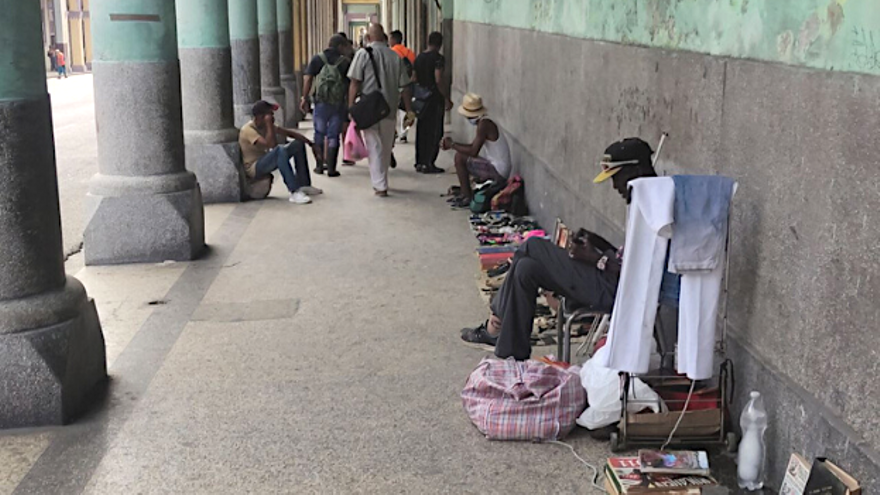
![]() 14ymedio, Juan Diego Rodríguez, Havana, 28 July 2022 — Cuban sidewalks are the scene of a good part of daily life on the Island. Taking the stool out of the house to get around the long blackouts, waiting for hours on the curb for our turn to come in a line, or setting up in that narrow strip , between the facades and the asphalt, a point of sale for anything, are just some of the uses of a space designed for the passage of pedestrians but converted into a scene of the informal market and daily survival.
14ymedio, Juan Diego Rodríguez, Havana, 28 July 2022 — Cuban sidewalks are the scene of a good part of daily life on the Island. Taking the stool out of the house to get around the long blackouts, waiting for hours on the curb for our turn to come in a line, or setting up in that narrow strip , between the facades and the asphalt, a point of sale for anything, are just some of the uses of a space designed for the passage of pedestrians but converted into a scene of the informal market and daily survival.
This Thursday, the high temperatures and the intense sun made it necessary to walk under the shade of the colonnades in Havana. In addition to the danger that a cornice, a roof or a balcony could come off and end up on our heads, avoiding El Indio and the harshness of his rays turns out to be the priority. But the centimeters are limited and looking for the shade also has its problems. The poorest in the city use that piece of road to try to survive.
Used books, old plumbing pieces, empty containers that once held shampoo or laundry detergent, make up part of the inventory of what is exhibited on the sidewalks of streets such as Galiano, Monte or Reina in the Cuban capital.
Under the protection of a colonnade, illegal vendors multiply, but they compete with passers-by to use a strip of territory that belongs to ordinary Cubans, never better said.
With a row of books displayed outside the “Alfredo Gómez Gendra” nursing home, in Centro Habana, a makeshift merchant alternated proclamations about his merchandise with reading of a book. A few meters away, another vendor repeated the scene, which lasted for several blocks although the merchandise on display varied.
As the sidewalk narrowed, pedestrians dodged a copper pipe as well as some shoes rescued from a dumpster. Sellers and customers thus shared the same goal: to occupy that part of any street where cars do not pass and the sun does not punish so strongly.
Without the skills of the mantas* in Madrid, or the mutual protection that the merolicos** of Havana’s La Cuevita market give each other, trading on a sidewalk is a high-risk profession in Cuba. The same person who buys a scrubbing sponge from you later denounces you for getting in the way. The sun that you avoid under a doorway you pay for in bribes to the corrupt policemen or in scares every time the patrol approaches.
But the portals and the sidewalks are not an impregnable armor either. The policemen who patrol the city make a killing with the fines and arrests of those who do not have their own business premises or a license to offer their miserable products.
Sitting down to pass the time during a blackout or play dominoes with friends is one thing, but opening a venduta — a tiny enterprise — among the shop windows and the rattle of collective taxis is another.
The sidewalk is free territory until the uniformed men are disturbed.
Translator’s notes
*Mantas: Literally ’blankets’, a reference to the street sellers who commonly spread their wares on them.
**Merolicos: Street sellers who ’specialize’ in glib patter to promote their wares which may include “miracle cures,” “amazing bargains,” and the like.
____________
COLLABORATE WITH OUR WORK: The 14ymedio team is committed to practicing serious journalism that reflects Cuba’s reality in all its depth. Thank you for joining us on this long journey. We invite you to continue supporting us by becoming a member of 14ymedio now. Together we can continue transforming journalism in Cuba.
